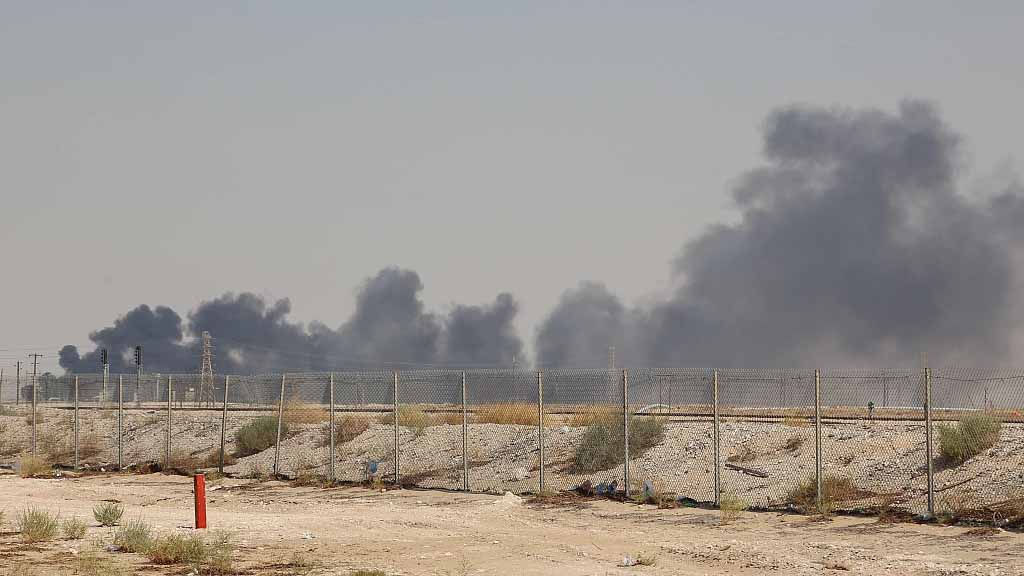02:09

Tensions in the Middle East are high after drone attacks hit two major oil facilities in Saudi Arabia. The attacks knocked out half of the country's oil capacity, more than five million barrels a day. Yemen's rebel group Houthis claimed responsibility. But Washington said its intelligence suggests that Iran was behind the attack, something Tehran denies. U.S. President Donald Trump told reporters on Monday that he doesn't want a war with Iran, after previously tweeting the U.S. was "locked and loaded". The Chinese Foreign Ministry is cautioning the international community to wait for conclusive facts before taking any action.
Some are convinced that it isn't a stretch to suggest Iran is behind the attack. Harlan Ullman, chairman of the Killowen Group and senior adviser with the Atlantic Council, says the first thing that the U.S. has to ascertain is who did the attack to avoid the same mistake in Tonkin Gulf in 1964. According to Ulman, the attack was brilliantly done in which 17 to 19 sites were destroyed with a high degree of precision. It'd be even difficult for the U.S. to carry out such an attack without any kind of fingerprints. Houthis don't have the capacity to attack unless they were cooperated by somebody else.
And Ahmed Al-Ibrahim, a Saudi political and security analyst, recognizes that the attack is bigger than 9/11 for Saudi Arabia. All of the evidence on this attack pointed to Iran. Saudi Arabia is going to either wage something against Iran or come up with a formula to contain the issue with its allies. Foolishness is in the whole Iranian regime and Iran doesn't have any capability except what Iran has developed through the sanction. Al-Ibrahim says that Iran is facing various serious domestic challenges. "Iranian regime is a default, it's only about time", says Al-Ibrahim.

In response to the attacks on the oil refinery, U.S. Secretary of State Mike Pompeo meets with Saudi Arabia's Crown Prince Mohammed bin Salman in Jeddah, Saudi Arabia, September 18, 2019. /VCG Photo
In response to the attacks on the oil refinery, U.S. Secretary of State Mike Pompeo meets with Saudi Arabia's Crown Prince Mohammed bin Salman in Jeddah, Saudi Arabia, September 18, 2019. /VCG Photo
However, some do caution against rushing into a conflict. Kaveh Afrasiabi, a political scientist and Iranian affairs analyst, said that other than Saudi Arabia, the rest of the international community doesn't think the attack came from Iran. "This is a crisis of their own making by their foolishness of siding with the U.S. in the illegal economic warfare against Iran, and the whole thing is now backfiring against them and hopefully, this will be a wake-up call in light of the proven military and economic vulnerability of Saudi Arabia in this case,"Afrasiabi claimed. It is doubted that Saudi Arabia is not well aware of Iran's deterrent capacity.
Taking a similar view as Afrasiabi, Hamoud Salhi, Associate Dean of the International Education at California State University, Dominguez Hills explains that it's not unprecedented that Saudi Arabia is going to declare that Iran did the attack. U.S. President Donald Trump has been waiting for Saudi Arabia to declare who did it. It's important for Saudi Arabia to take this opportunity as it has been urging the U.S. to attack Iran for a long time. According to Salhi, Houthis will benefit greatly with what's happening because they want to take the conflict into Saudi Arabia.
The rushing-to-war attitude taken by the U.S. and Saudi Arabia and the cautious international community is coming into conflict. Without an international consensus, it is sure going to be difficult to find an appropriate solution for this crisis.
(If you want to contribute and have specific expertise, please contact us at opinions@cgtn.com)